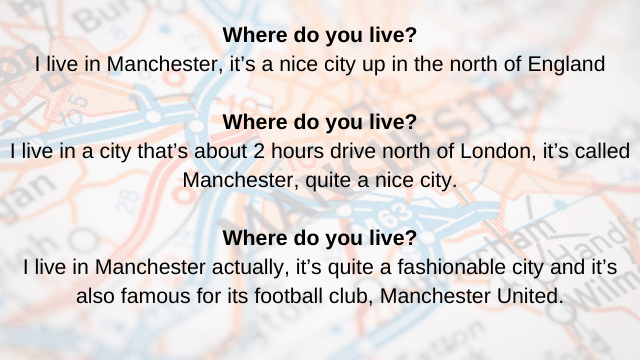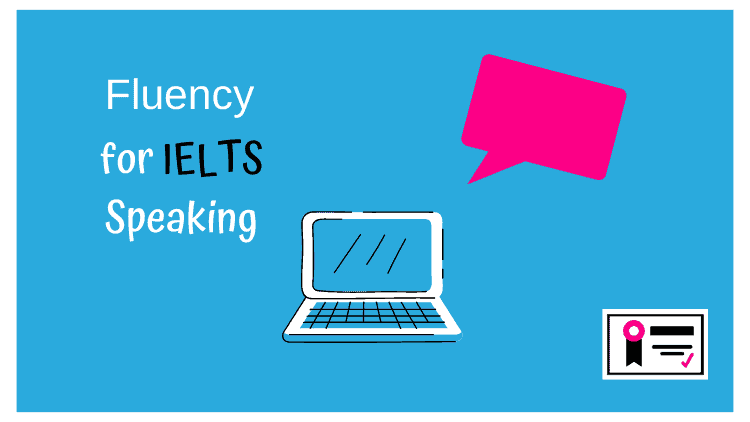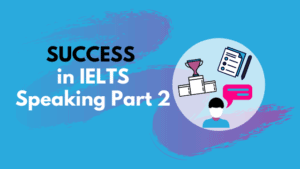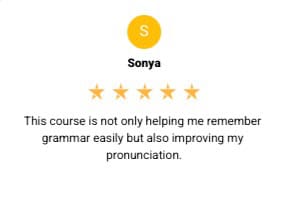How to Get a High Score in IELTS Speaking
Everybody wants to get a high score in IELTS Speaking.
However, it seems to me that a lot of students are preparing for IELTS Speaking the wrong way.
They are using tips they pick up off ‘anybody’ on the Internet.
If you’re following the wrong advice, you may end up with a much lower score than you deserve.
Let’s fix that right now with 8 powerful strategies you can use to get a high score in IELTS Speaking.
Table of Contents
Be patient
Only book your test when you’re ready!
Some students ask me for a study plan to go from band 4 to band 8 in 4 months.
I am afraid that is impossible!
You will need at least 120 hours of guided study to go up a Band.
If you study 1 hour / day (5 hours a week), it will take you 24 weeks or 6 months.
Being ready means to be sure…
- you have the correct level of English (or slightly higher, because remember you will perform slightly lower than your real level in the exam, due to nerves)
- you are familiar with the test format.
Knowing the test format includes knowing,
- The common topics
- Part 1 answers are fairly short, around 15 seconds
- In Part 2 you should try to speak for up to 2 minutes
- You can make notes and keep them as you talk
- In Part 3 the examiner will interrupt a lot
Get a high score by building flexibility
The mistake most people make is they find the IELTS Speaking questions on Internet and then write down an answer, and learn that one fixed answer.
You may think this gives you confidence.
But it won’t work.
If you memorise the answer the examiner will know and mark you down.
You have no flexibility.
What you should do is find some questions and practice answering the same questions in 2 or 3 different ways.

Build your vocabulary
To get a high score in IELTS Speaking you should remember to make good use of a wide range of language, including:
- Adjectives
- Adverbs
- Collocations
- Idioms
Here are some simple examples:
Adjectives (used to describe nouns)
- Outstanding
- Fantastic
- Top-notch
Adverbs (used to describe verbs or adjectives)
- Immensely useful
- Extremely powerful
- Hugely helpful
Collocations (words that commonly go together)
- Have a shower
- Take a shower
- A refreshing shower
Idioms
Don’t over-use idioms, just use a few in the test.
- I was tickled pink about it (very happy)
- I was full of beans (full of energy)
Fix your grammar mistakes
Get feedback from a teacher to help you discover the common grammar mistakes you always make.
Fix those mistakes with
- Practice
- Repetition
- Repetition in different contexts
I teach a great way to start using grammar without thinking in my FLUENT GRAMMAR in IELTS SPEAKING online course
Get a balance
When trying to get a high score in IELTS Speaking some students try to create very complex sentences, thinking these ‘band 9’ sentences will get them a high score.
However, what actually happens is they sound unnatural and not at all English.
This will give you a low score.
For example, a student may create a sentence like this:
There is a plethora of pernicious activities effectuated by personages on the heavenly body known as earth.
Totally unnatural!
You will need to mix both simple and complex language in your answers.
Something like this is much better:
There are lots of harmful activities carried out by humans on our planet
Or
There are lots of detrimental activities carried out by people on our planet
Get a balance!
Don’t memorise answers in the IELTS speaking test
If you memorise your answers for Part 1, Part 2 or even Part 3, the examiner will know and you won’t get a high score.
You will be marked down.
That said, when learning a language, memorising words is a great technique.
Indeed you can memorise
- words
- chunks
- phrases
but not whole sentences and certainly not whole answers.
Start your IELTS speaking test with simplicity
At the beginning of the IELTS Speaking test, in Part 1 when you get the ‘warm up‘ questions about your name, what you do or where you live, then give simple answers.
This will help you warm up, and get used to the examiner.
Then as you warm up, you can start to give more complex answers.
This will help you build your confidence slowly at the start of the test.
Prepare your mindset to get a high score
When preparing for IELTS Speaking, students remember to build their language skills and get familiar with the test format, including common topics, but many forget their mindset.
They don’t realise how important your mental preparation is.
You need to believe in yourself.
Remember the test is a conversation, not a police interrogation, and most examiners want you to succeed.
Before entering the test room, relax and start to think you are going to enjoy the test.
Start to think, you are going to succeed. You have spent a long time getting ready, you can get the score you need.
Get mentally prepared and you will have a much better chance of getting a high score in your IELTS Speaking test.
Good luck.
Leave a comment below and let me know what you are doing to get ready for your IELTS test.
Improve your Speaking Skills with this Free Course
Crack IELTS Speaking Part 1
Learn to Speak with Confidence in Part 1 of Your IELTS Test!
⭐️⭐️⭐️⭐️⭐️
‘It’s such a great course. I’ve learned so many usages for speaking part 1.’
Zu Htet







4 thoughts on “How to Get a High Score in IELTS Speaking”
Hi dear teacher. I’m Iranian and I am going to take the IELTS exam.Iam living in Turkey.
Thanks for following me and best of luck with your exam!
I need phrasal verbs as well as idioms
That’s right, thanks for adding that.